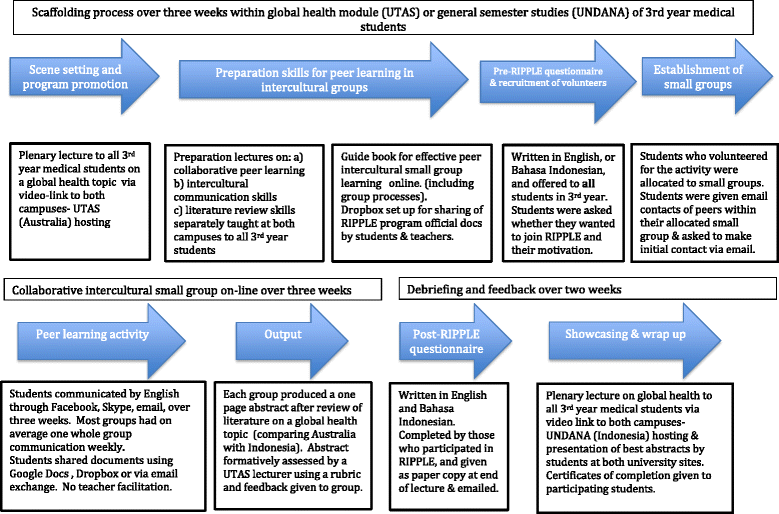Learning global health: a pilot study of an online collaborative intercultural peer group activity involving medical students in Australia and Indonesia
- PMID: 28086875
- PMCID: PMC5237179
- DOI: 10.1186/s12909-016-0851-6
Learning global health: a pilot study of an online collaborative intercultural peer group activity involving medical students in Australia and Indonesia
Abstract
Background: There is limited research to inform effective pedagogies for teaching global health to undergraduate medical students. Theoretically, using a combination of teaching pedagogies typically used in 'international classrooms' may prove to be an effective way of learning global health. This pilot study aimed to explore the experiences of medical students in Australia and Indonesia who participated in a reciprocal intercultural participatory peer e-learning activity (RIPPLE) in global health.
Methods: Seventy-one third year medical students (49 from Australia and 22 from Indonesia) from the University of Tasmania (Australia) and the University of Nusa Cendana (Indonesia) participated in the RIPPLE activity. Participants were randomly distributed into 11 intercultural 'virtual' groups. The groups collaborated online over two weeks to study a global health topic of their choice, and each group produced a structured research abstract. Pre- and post-RIPPLE questionnaires were used to capture students' experiences of the activity. Descriptive quantitative data were analysed with Microsoft Excel and qualitative data were thematically analysed.
Results: Students' motivation to volunteer for this activity included: curiosity about the innovative approach to learning; wanting to expand knowledge of global health; hoping to build personal and professional relationships; and a desire to be part of an intercultural experience. Afer completing the RIPPLE program, participants reported on global health knowledge acquisition, the development of peer relationships, and insight into another culture. Barriers to achieving the learning outcomes associated with RIPPLE included problems with establishing consistent online communication, and effectively managing time to simultaneously complete RIPPLE and other curricula activities.
Conclusions: Medical students from both countries found benefits in working together in small virtual groups to complement existing teaching in global health. However, our pilot study demonstrated that while intercultural collaborative peer learning activities like RIPPLE are feasible, they require robust logistical support and an awareness of the need to manage curriculum alignment in ways that facilitate more effective student engagement.
Keywords: Global health; Intercultural learning; Internationalisation; Peer learning; Tropical disease; e-learning.
References
-
- Frenk J, Chen L, Bhutta ZA, Cohen J, Crisp N, Evans T, Fineberg H, Garcia P, Ke Y, Kelley P, Kistnasamy B, Meleis A, Naylor D, Pablos-Mendez A, Reddy S, Scrimshaw S, Sepulveda J, Serwadda D, Zurayk H. Health professionals for a new century: transforming education to strengthen health systems in an interdependent world. Lancet. 2010;376:1923–1958. doi: 10.1016/S0140-6736(10)61854-5. - DOI - PubMed
MeSH terms
LinkOut - more resources
Full Text Sources
Other Literature Sources
Medical


